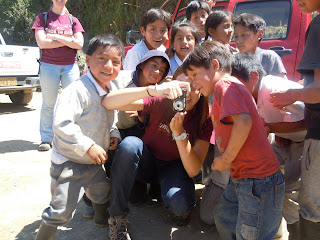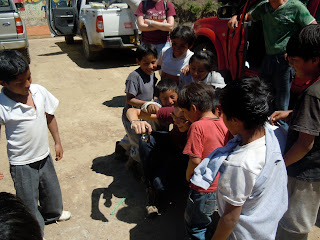We've made it (almost)! We've been in Ecuador since May 22nd, with only one robbing incident and one seriously ill from food. I'd say that's pretty successful. Things I'm ready to go home to: Virginia summer, sweet corn, not eating in a restaurant, berries, my own bed....nonetheless I am a bit sad to have to say goodbye to my temporary home here.
 |
| He's gotten so big! |
This morning Jessica, Trevor, Robert, and I headed to the Alumbre watershed to present a little bit of our results and attempt to educate some about conservation practices. While we don't have many conclusive results yet (Albert, Katie, and Lauren are still finishing up the report), one thing was clear from the beginning: most farmers don't know what conservation practices are, and if they are actually using any of the practices, they don't know the name for them.

For those interested, we talked about strip cropping, deviation ditches, minimum tillage, live barriers, rotations, and planting on the contour. The attendance was good, somewhere around 20 adults + children, gathered in the local schoolhouse. Just before the presentation began, the electricity cut off. The solution: send someone out to jiggle the wire; it worked, but I wasn't convinced that our information was worth risking someone's life over...
The presentation lasted about 20 minutes; the most controversial part was a table we displayed with some pricing data from last year. Unfortunately this year prices are quite low; Moazir mentioned that this is partly due to a large surplus on the market after high prices last year. It is evident that there are concerned farmers in the community, but they are plagued with a lack of access to information, as INIAP functions as the only sort of extension service, and they are primarily focused on research, not extension activities. Pesticide use was also a hot topic, with lots of questions about the possibility of a class to teach proper application techniques and which products are useful for which diseases. A common complaint beyond technicalities was the general loss of workers to the cities; as in the US, the youth have lost interest in agriculture and are fleeing to the cities to work in construction.
 |
The kids are always a big fan of our cameras- I got swamped every time I pulled it out
 |
I felt a bit nostalgic on the way back to Guaranda, ensuring that I took pictures of things I hadn't bothered to before. One of these included the dump for the town of Chillanes: essentially the town's dump trucks unload over the side of the mountain, and the trash is later burned. Of course all the run-off reaches the river below. An unfortunate part of the developing world: lack of environmental laws. Moazir and I also talked this morning about the large amount of deforestation taking place. Within his lifetime (35 years or so), mountainsides have gone from being covered in forest to stripped bare for cultivation. The Agricultural Ministry supposedly has a project for re-forestation, but mainly consists of giving seeds to communities with no technical advice about proper planting.
On a brighter side, here's one of women of San Pablo who make delicious tortillas out of corn and wheat. We had to stop for one last taste.
Tomorrow morning we leave for Quito to buy some last minute gifts (and in my case demolish some more mango and coconut ice cream), and we'll be flying home on Friday. While I may write another entry or two here, I want to express a thank you again to those who have been reading. I've had readers from every continent (minus Antarctica), including most of Western Europe, the majority of South America, and an oddball from Kuwait. This blog, in its short lifetime, has reached nearly 1000 pageviews (though admittedly most are probably from my parents!) I've been encouraged to write as often as I can, and in doing so I feel I've better processed the daily happenings of this journey and my general understanding of this country. I thank you all for that. More pictures from our travels will be added to my
flickr account in the coming days and weeks upon my return to Blacksburg and high speed internet. Until the next, muchas gracias.


